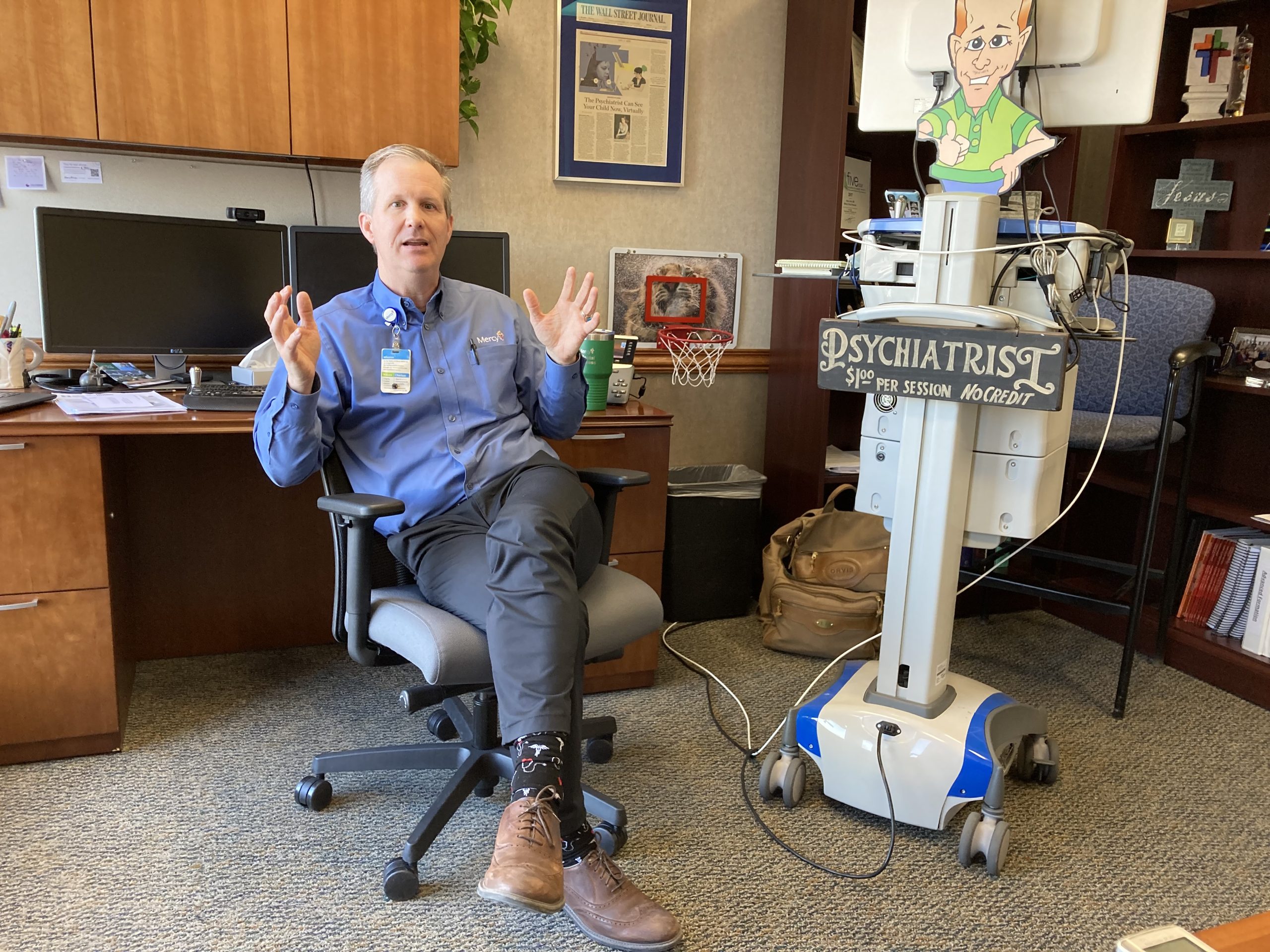Summary
For people struggling with substance use disorder, detoxing and maintaining recovery can be incredibly difficult — especially when they have no safe or substance-free place to be. These are the stories of five Springfieldians who have experienced this difficulty.
Correction: The original version of this story had incorrect information about Hope Homes of the Ozarks. Hope Homes are not operated by Freedom City Church.
A year and a half ago, Heather Cole got out of jail and learned her 18-year-old daughter had died by suicide.
As any parent would be, Cole was devastated.
Cole, who at the time had been using drugs for 15 years and was homeless, went on a “little rampage” with her use of methamphetamines.
“I got so bad after finding out that she passed away that I was going to kill myself,” Cole said. “I was doing too much. I wasn’t trying to die. I just didn’t want to feel. I didn’t want to deal. My whole world flipped on its axis.”
As the day of her daughter’s memorial approached about a month later, Cole was determined to honor her daughter by being sober at the service.
“I didn’t want my daughter to see me high,” Cole said, crying. “I wanted to honor Cheyanne in Heaven, not being high at her memorial.”

But how does someone in Cole’s situation get and stay clean? Cole was addicted to meth, a substance that doesn’t require a medical detox bed in a hospital setting. And at the time, Cole was homeless with nowhere to be that wasn’t around other people who were using drugs or alcohol.
For people who don’t have a safe and substance-free place to stay, getting clean and staying clean long enough to get into a recovery program can be extremely difficult.
Fortunately for Cole, a longtime homeless advocate named Katrin Scott heard about the death of Cole’s daughter and reached out. Scott’s own son died in 2015.
“She knew where I was at in my head, so she was right there,” Cole said of Scott.
Back then Scott was an employee at the Connecting Grounds’ Outreach Center. The Connecting Grounds is a church that works to help Springfield’s unsheltered Community.
RELATED STORY
What to know about substance abuse detox in Springfield
A guide to alcohol, drug and other substance abuse detox options in Springfield, Missouri. What is detox? How to safely detox?

Scott and Connecting Grounds’ Pastor Christie Love put Cole in a motel two days before Cheyanne’s memorial service so the grieving mother could have some time away from others who were using, to rest and get clean.
After the memorial service, Love and Scott told Cole they would help her get into an inpatient treatment program, if that’s what Cole wanted. They offered to continue paying for the motel room until an inpatient bed became available.
Knowing this is what her daughter would have wanted, Cole agreed.
“It took almost a month, month and a half to get in,” Cole said. “But if they hadn’t put me in a motel room (where) I was isolated away from my people, places and things, and my mindset — I don’t think if they wouldn’t have done that for me, that I would have been able to stay clean to get into inpatient.”
Cole has been clean since Dec. 3, 2020 — two days before her daughter’s memorial. She now lives at Eden Village II, a planned community of tiny houses for chronically and disabled homeless people.
Changing your social circle is tough when unsheltered
Cole works for Scott’s No Reservations Food Truck and catering service. Scott created No Reservations as a way to help her homeless and formerly homeless friends learn how to be part of the workforce again.
It’s the first job Cole has had in more than a decade.
She continues to do outpatient classes, group meetings and regular visits with her sponsor.
“Even after being 16 months clean, I’m still one bad emotional moment, one bad choice from a relapse,” Cole said. “But I’m a little stronger today. I do things differently. Like I changed my people, places and things. And I have more positive people around me and uplifting people, people that genuinely care.”
Mikey H. is one of those people.

Mikey works with Cole and Scott on the No Reservations Food Truck and is also in recovery. Like Cole, Mikey lost his son to suicide.
But unlike Cole, Mikey is having to do his recovery and working to maintain his sobriety while living on the streets. That means he is often surrounded by others who are still using or drinking.
“It’s very hard,” Mikey said.
A man of few words, Mikey asked that Cole be there for his interview with the Daily Citizen. The two are close, Mikey said, and Cole is familiar with his story.
“He doesn’t want to go to Vets anymore, and that is where he can get daily dinner,” Cole said on behalf of her friend. “When your crowd is at the (Veterans Coming Home), trying to stay clean is not an easy thing to do. You run into people who are like, ‘Hey buddy, you want something?’
“It’s in your face,” she continued. “When you are homeless, you go to all these places to eat, to get resources, and everybody is there.”
Mikey agreed.
“There’s a lot of drama,” he said. “There’s lots of drugs, alcohol.”
Day-time treatment falls short when night falls
Veterans Coming Home is the only daytime drop-in center in Springfield where homeless people are allowed to gather during the day. Church groups and volunteers serve meals there every day.
With Scott’s help, Mikey was able to get into what’s known as ‘social-setting detox’ at Burrell’s Behavioral Crisis Center - Rapid Access Unit. Social-setting detox is a short-term, nonmedical treatment program that allows someone a safe place to rest while they detox from substances.
Had Mikey been at risk for seizures when he detoxed from alcohol, he would have qualified for a medical detox bed in a hospital. Mikey recalled having “the shakes,” but had no history of seizures when he quit drinking.
Mikey was at the Rapid Access Unit for three days. He now does outpatient classes and therapy 8 a.m. to 3 p.m., five days a week at Burrell’s Murney Clinic. The program Mikey is in typically runs about six months, but Mikey asked that he get to do an additional six months.
“I feel like I need a longer time,” Mikey said. “I want to be strong enough so I know I won’t relapse.
“I’ve been doing it for 22 years, drinking and getting high every day,” Mikey said. “And now, in a year’s time, I’ve changed a lot, I think.”
He is on the waiting list to get into a tiny house at Eden Village and hopes one day soon, he and Cole will be neighbors. Eden Village I and II are both full at this time, with about 85 qualified people on the waiting list for a home.

Just last week, Mikey was approved for a housing voucher, which will pay his rent if he can find a landlord willing to accept it. (Homeless advocates and case managers have been complaining for more than a year that most landlords in Springfield no longer accept housing vouchers.)
Scott, the homeless advocate who operates the No Reservations Food Truck, recalled peoples’ reaction when she asked Mikey to work on the food truck more than a year ago.
“Everybody was like, ‘There’s no way in hell Mikey … is going to do that. He just gets high all day, every day,’” Scott said. “Everybody was like, ‘Oh, he’ll never — he’ll run and hide. He’ll flake out on you. It won’t last. He won’t be able to stay sober.’”
Still, Scott said she encouraged Mikey to help out with the food truck. In the beginning, he wasn’t always sober and really struggled to be part of a team.
“It was a challenge for our team and for me to help him get through that, to be able to work and to learn people skills and coping skills,” she said, “without being able to self-medicate. And he got suicidal a couple of times.”

Too sober for treatment?
One day, the food truck team took the day off and went swimming at the river. Mikey was very drunk that day and tried to jump out of Scott’s vehicle while she was driving.
“It really scared us all, and we were like, ‘You’ve got to get help. You are going to get help. We’re going to see you through this,’” Scott said, smiling at Mikey. “And I have stuck right by his side through all of it since that day.”
Scott recalled three or four different efforts to try to get Mikey into treatment. One effort started when he showed up drunk to his treatment class at the Murney Clinic. The staff at Murney sent Mikey to the emergency room. (People usually go to the emergency room to be assessed and determined if they require medical detox and/or referred to a treatment program.)
Staff at a treatment program in Joplin said they had a bed for Mikey and sent someone to pick up Mikey at the emergency room. Scott said she remembers being so excited for Mikey and packing a bag of clothes for him to take to rehab. She remembers the two nurses in the emergency room were also so happy and relieved that Mikey was going to treatment.
But the driver from the Joplin treatment program didn’t arrive till about 5 p.m.
Mikey, who had been in the ER since early that morning, had sobered up by that time.
“That nurse called and she was practically crying,” Scott said. “She said his test came back with nothing. He has no alcohol in his system and they refuse to take him.
“I still get emotional thinking about it,” Scott said, starting to cry.
The same thing happened to a young man named J.P., someone Scott considered to be like a son.
J.P. overdosed and died last April.
Where to get help in Springfield
CoxHealth’s Center for Addiction
Mercy’s Chemical Dependency Services
Burrell Behavioral Health’s Addiction Recovery Services
Jordan Valley Community Health Center’s Medication-Assisted Treatment
Eustasis Psychiatric and Addiction Health
Springfield Missouri Alcoholics Anonymous
Southwest Missouri Area of Narcotics Anonymous
If you would like to add your organization to this list, email jrehwald@hauxeda.com.
Scott said she knows of other people who’ve had similar experiences of not being able to get into a treatment facility because they weren't using on that day — which, in her view, shouldn’t be a dealbreaker since obviously the people are wanting to get clean.
“I don’t think the facility tells them to go get high, but they’ll say you have to have something in your system,” Scott said. “And what if that something is the last something they get?”
“It might be something that kills them,” Cole added. “Or they get so high they don’t come back.”
When Scott saw Mikey after the incident with the Joplin treatment program, she went right back to encouraging and supporting Mikey’s desire to get help.
“I’m like, ‘You just got to keep trying. You’ve got to keep knocking on those doors.’ So I drove him right back to Murney the next morning,” she said. “He has continued to successfully return to Murney every day for day treatment.
“Mikey — he’s been hopeless for most of his life with zero people feeding any encouragement into (him) and he just turned angry. Fighting and doing drugs and hustling drugs for others was the only way he could make friends,” Scott said. “The transformation of Mikey is miraculous. Heather always had it. She just had to get in that place mentally.”
Cole took a moment to address Scott.
“I don’t think that you or (Pastor Love) know just exactly what you guys have done for me. It was so much more than spending money to put me in a hotel,” Cole said. “You gave a damn. You cared enough to do something for me. I was worthy enough somehow for you guys to care enough to do that for me.

“I felt so guilty and shameful and I was such a piece of s**t. I wasn’t worthy of life,” she said. “For strangers to invest in me like that, it just was a lot. And that somebody cared when you think nobody cares.”
‘Losing everything in six months’
Delana and David have been a couple for several years. Though they have been clean and off the streets for more than six months, they asked their last names not be used.
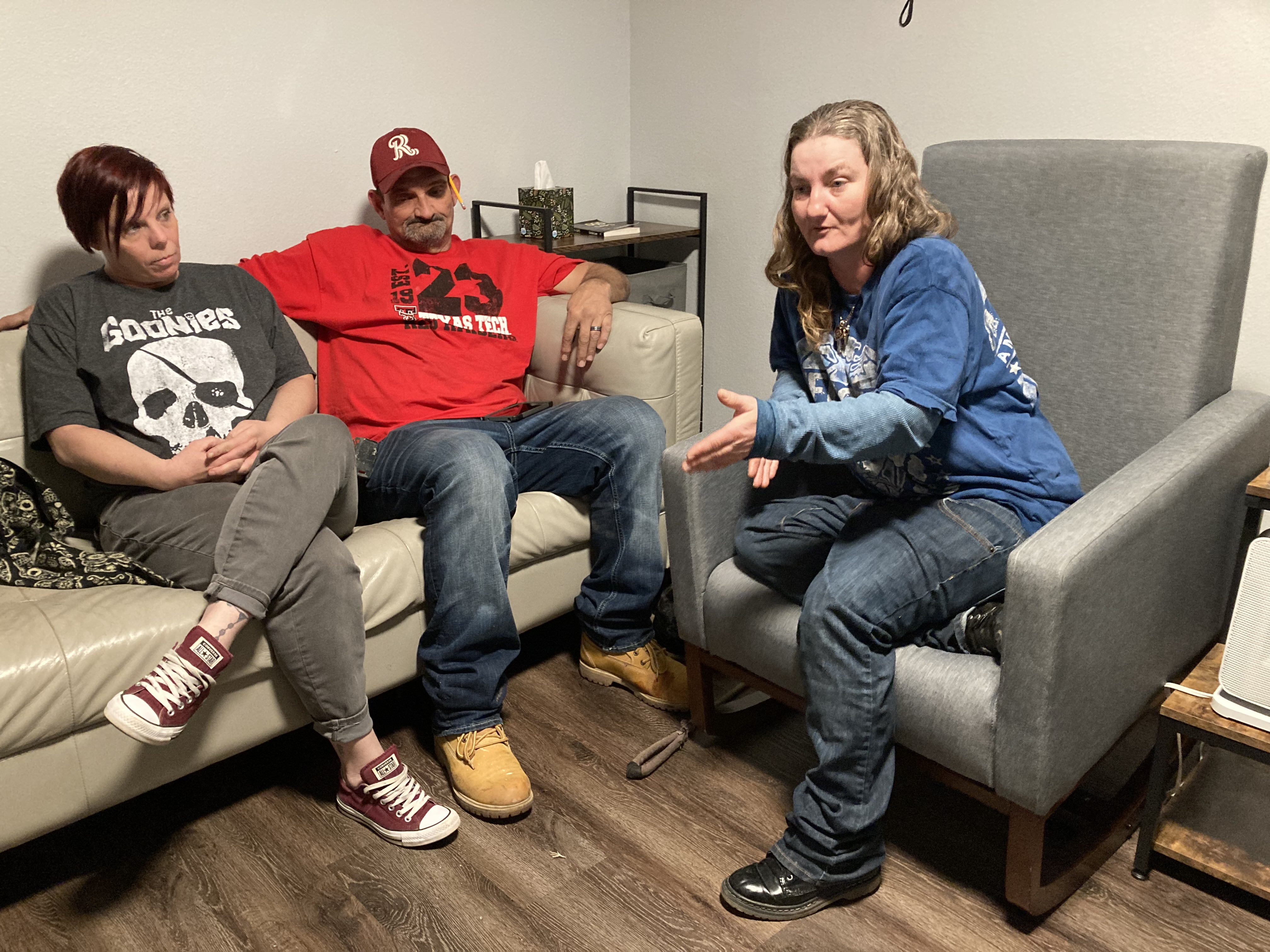
Delana said she started drinking when she was about 12 or 13. She hurt her back when she was in her 20s and began abusing pain pills.
She quit using pills when she was pregnant with her daughter at age 37, but returned to using after the baby was born.
“I went right back to pain pills. And I mean, honestly, I found out how much I could make selling pain pills,” she said. “I was on Hydrocodone and then they switched me to Oxycodone. And then I was on Klonopin for anxiety. And as soon as I went off that, I switched to meth.”
“Pills are probably the worst to come off because your whole body hurts,” she said. “Every joint in your body hurts. I mean, honestly you get diarrhea, cold chills that turns into hot sweats.
“Detoxing off that is probably the worst thing I’ve ever done and I could never go through it again,” Delana said. “I’ve been clean off the pills for six years.”
She continued to occasionally use alcohol and meth.
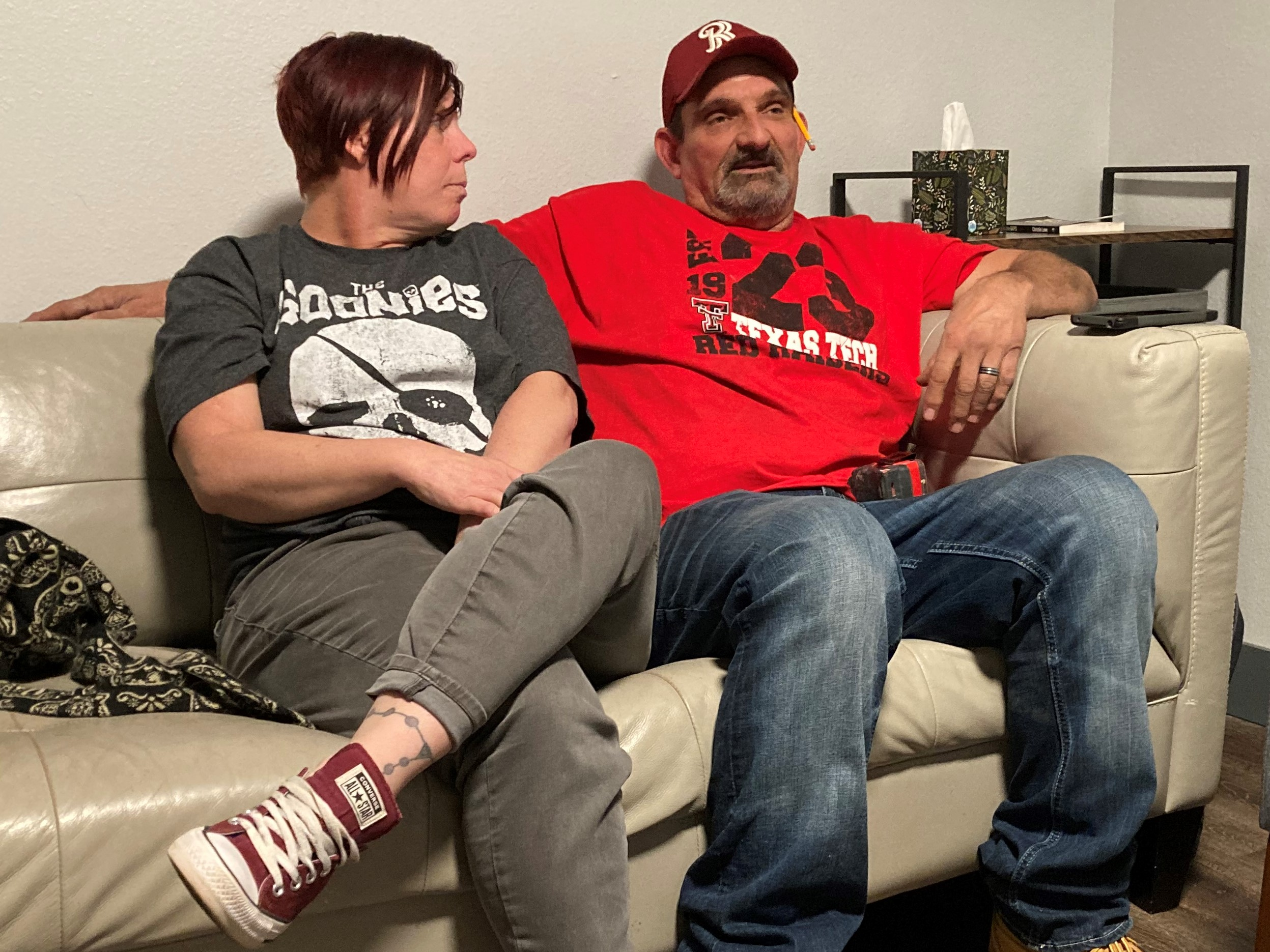
When she was 40, she lost the custody battle for her daughter to her ex-husband. (Children’s Division was not involved in her losing custody of her daughter. It was family court and they settled in mediation.)
“I told the judge she was better off with her dad,” Delana said. “That was the hardest thing I’ve ever had to do. To say that you are not fit to take care of your own child, to do that and then go to an empty house — that was the worst feeling in the world.
“And I had no one to turn to, so I turned to drugs,” she continued. “And then I lost everything.”
“I’m like the poster child for in six months what meth can do to you. I lost my job. I lost my kids, lost my house, lost my car. I lost everything in six months.”
Delana said she has been so desperate for help in the past that she’s gone to the hospital and told them she was suicidal. She said she knows of others who have done the same thing, regardless if they are serious about taking their own life.
“That is the first question they ask, ‘Are you suicidal?’” Delana said. “At first you are proud and you don’t want to ask for help. But then you have to say you are suicidal just to get in the program.”
The hospital program she is referring to focuses on mental health issues, not just substance use disorder. Delana and David said they know of others who have claimed to be suicidal to get into these types of programs so they could detox.
The worst thing about Springfield is they will give you a little bit of a handout. But very seldom do you get a hand up.”
Delana
David said he started using meth intravenously at age 14.
“I’ve been an IV user since the first time I did it,” he said. “I grew up in prison. And back then, (drugs were) in prisons, too. And growing up and learning how to be a man from guys in prison, my social skills ain’t real great. But I’m working on it.”
About a year ago, Delana was arrested for a probation violation and was sent to serve a 120-day treatment, also known as “shock treatment.”
David had a warrant for his arrest at the time. He turned himself in so he could serve his short prison sentence while Delana was in treatment. He said he wanted to get it over with while Delana was also locked up, so he wouldn’t have to worry about her being on the streets without him.
He got out of prison a month after Delana was released, and today they live together in a rented RV.
“We both had to want it at the same time,” Delana said of their sobriety.
Today, Delena is in outpatient treatment through Preferred Family Healthcare. She attends classes and therapy at least twice a week. David has a job and attends weekly sobriety support meetings.
“Outpatient is a great option,” she said. “But you have to have someplace to go (when you are not in treatment).
Her daughter was 5 when she lost custody. Today, the girl is 9. Since getting clean and sober, Delana has been able to visit with her daughter again.
Speaking about her daughter was clearly hard for Delana.
“It still is a trigger for me. I miss her,” she said, wiping away tears. “I beat myself up every day that I’m not with her.”
“I was stupid to make some of these choices because it led me to become homeless,” she continued. “And then once I was there, it didn’t really matter. Once you get so far down — the worst thing about Springfield is they will give you a little bit of a handout. But very seldom do you get a hand up.”
Delena and David met with the Daily Citizen in early March at the Connecting Grounds Church.
At the time, a friend of theirs named Darlene was staying with them in their RV. Because the couple is renting an RV from David’s boss, Darlene was only allowed to stay a few days.
But on that day, Darlene said she had been clean from meth for three days and desperately wanted to get into an inpatient treatment facility — or any place where she could be away from people on the streets who are still using.
“She called us the other day,” Delana said of Darlene. “She said, ‘I’ve got to get out of here.’”
Asked if she felt desperate, Darlene nodded.
“For me to ask, I had to be desperate,” Darlene said. “I was crying. And I don’t cry.”
The challenge for Darlene is that she has a dog named Echo who she is very attached to and she refuses to leave. Four-year-old Echo’s been by Darlene’s side since she was a puppy. Darlene described the dog as her baby, protector and source of comfort.
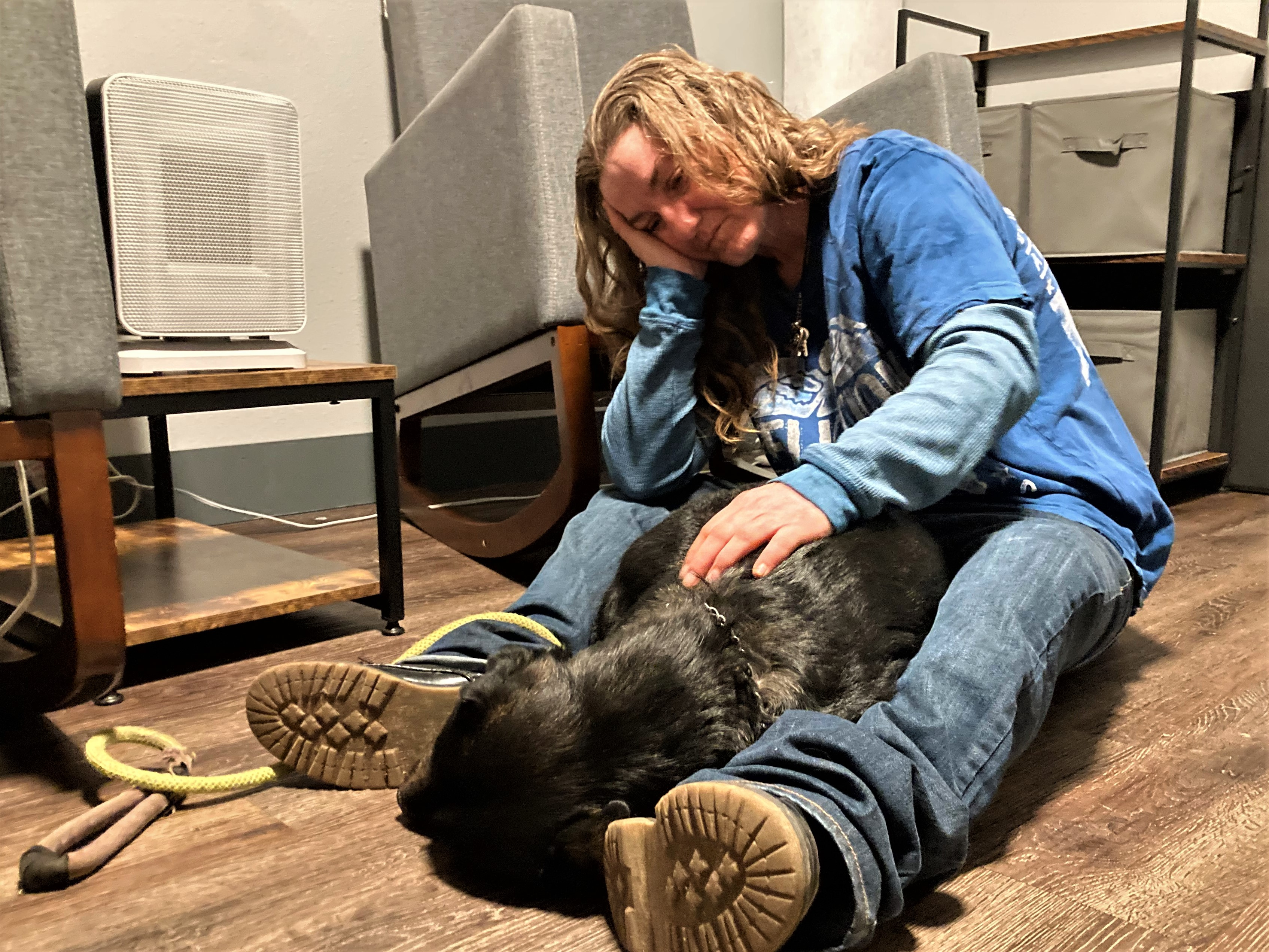
“I can’t get in nowhere because I have a dog,” Darlene said, rubbing Echo between the ears.
Delana, Dave and Darlene all spoke about how hard it is for those who don’t have a safe place to get clean, but are unable to get into a detox or inpatient treatment program.
And it’s incredibly discouraging for folks when they finally ask for help, but are told nothing is immediately available, David said.
“It takes a lot to acknowledge that you even have a problem and then, even more, to ask for help,” he said. “And when you do finally break down and get to a point where you are going to ask for help — and they deny you or they turn you away — then what else do you got? You just go back out there onto the street.”
“You feel like you don’t matter enough to get the help,” Darlene interjected.
“That messes with their head, too,” David said. “They tell you that enough times, you start to believe it.”
Treatment program rules cause barriers
Delana expressed frustration with some of the rules different treatment programs have.
“Some of them, you have to be clean to get into the program. You have to take a (urine analysis), and if you are not clean, they’ll send you away,” Delana said. “If you have to wait another seven to nine days, well, you are going to get high in those seven to nine days.
“The day that you ask for help is the day you need help,” she added.
The reason some programs require a person to be clean before being admitted is because it can be difficult for someone to focus on the treatment classes if they are still detoxing from substances. It can also be hard for those already in the program when someone comes in intoxicated or high.
Other inpatient programs, like the Joplin-based program that turned Mikey away, won’t admit someone unless they have substances in their system and have a positive urine analysis.
Though she wasn’t experiencing any painful or dangerous withdrawal symptoms on the day of the interview, Darlene said she hopes to find some sort of detox or inpatient program that would allow her to keep her dog.
“I just need to be away from the chaos,” she said.
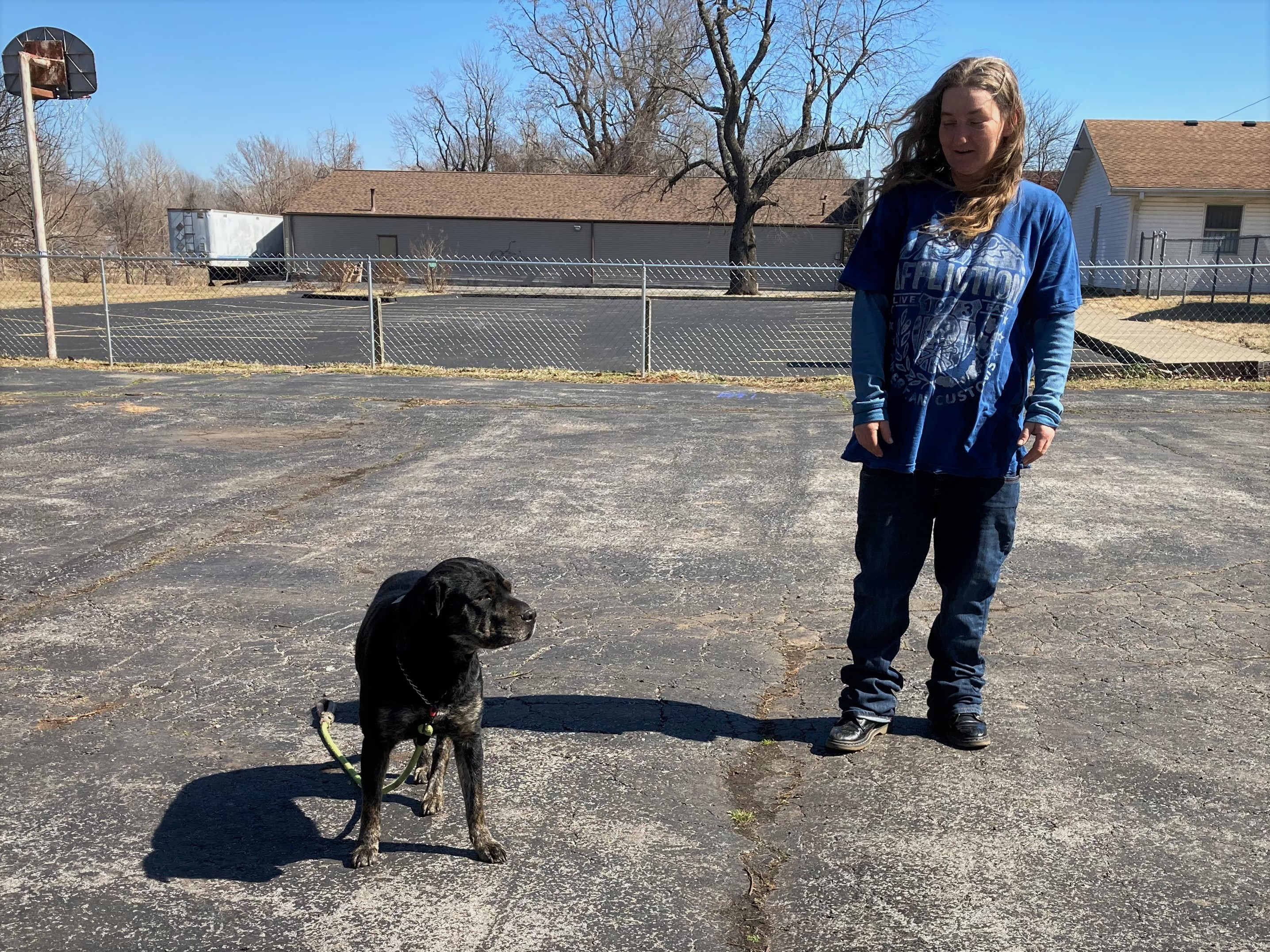
Pastors, recovery advocates weigh in
Pastor John Alarid with Freedom City Church has been involved with recovery housing for 24 years. Alarid, too, is in long-term recovery from heroin addiction.
He operates the Hope Homes of the Ozarks, an intense one-year residential discipleship and recovery program, and Straight Street.
From his perspective, the difficulties of getting someone into a detox program — whether it’s a social detox or medical detox — is a huge problem that he deals with on a weekly basis.
A person must be detoxed before being admitted into a Hope Home.
“We are not a medical facility. We are a social model of recovery,” Alarid explained. “Sometimes (detoxing) can be dangerous, even life-threatening.”
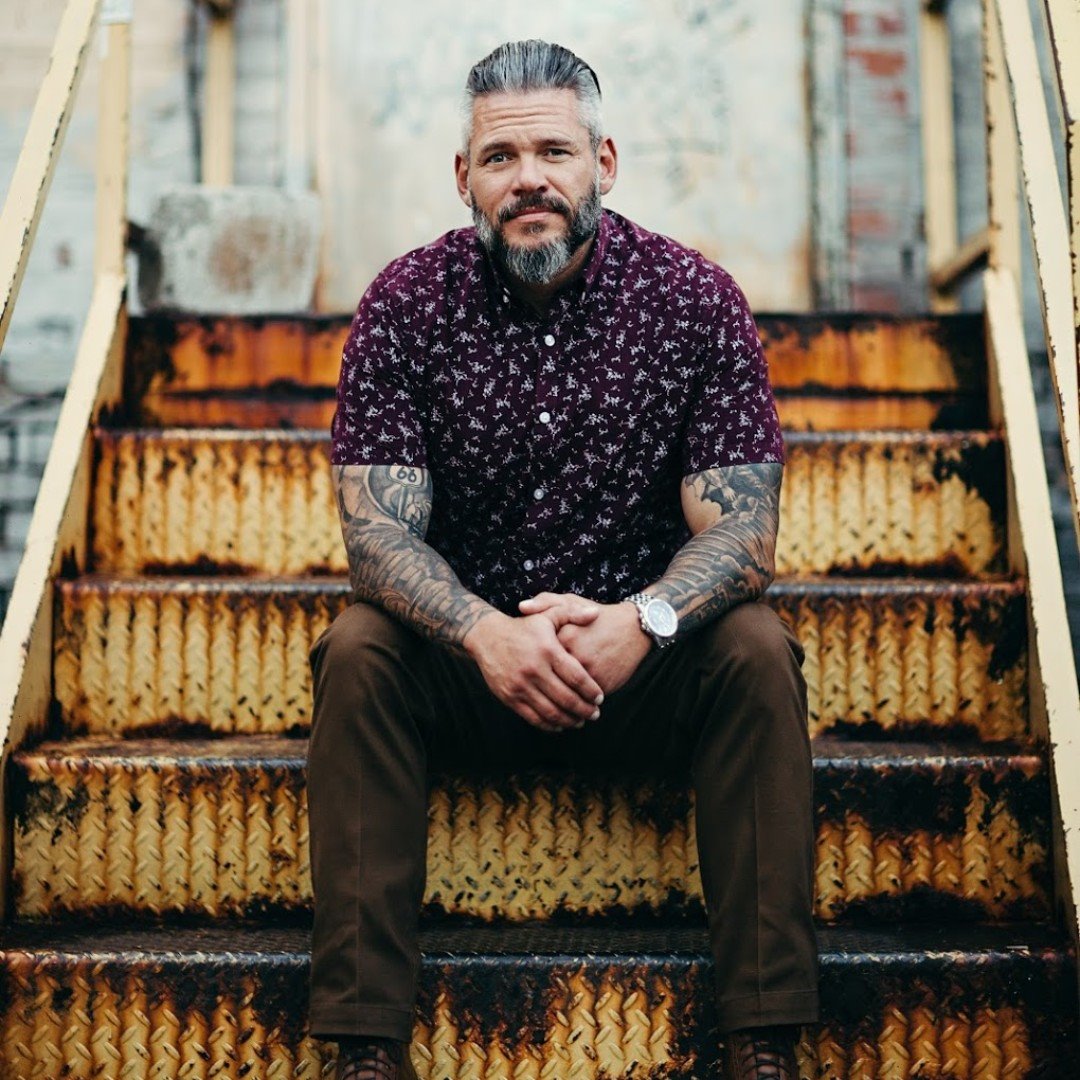
“Years ago, we would let them come in and detox at the house because there were no other options. We do not do that anymore for liability reasons,” Alarid said.
In addition to those liability reasons, Alarid said it’s not a good idea to put someone who is still under the influence in a house full of people who are working on their own recovery.
“You cannot take somebody that’s spun out on meth and put into a social model of recovery,” he said. “It’s a huge trigger. It’s problematic for everybody in the house.”
Straight Street is partnered with Burrell Behavioral Health’s MAT (medically-assisted treatment) Program, Alarid said. They also utilize Burrell’s social-setting detox program at Burrell’s Behavioral Crisis Center.
If someone has a severe addiction to opioids, alcohol or benzodiazepines, they must be assessed at the hospital to determine what kind of detox program they need, Alarid said.
“It’s such a key part of starting the recovery process: getting in and getting detoxed so they can work on their recovery plan,” Alarid said. “At least in the recovery community, this is a huge issue.”
Finding detox beds is becoming more difficult
David Stoecker is the co-founder of the Springfield Recovery Community Center and executive director of Better Life in Recovery. Stoecker is in long-term recovery himself and often helps others get connected with treatment programs.
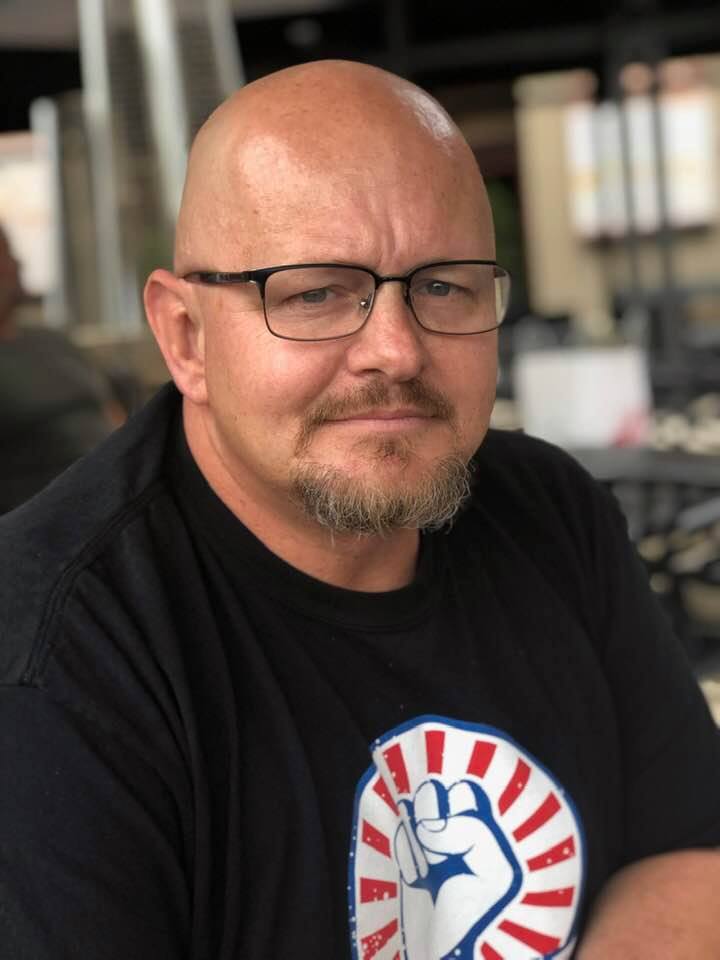
Stoecker said unless someone has a severe addiction to alcohol or benzodiazepines — the two substances that detoxing from can be life-threatening — finding a detox bed is getting harder and harder.
While it’s not life-threatening to detox from a substance like methamphetamine, social-setting detox beds are so important to the recovery process, Stoecker said.
“You get a chance to catch up on your sleep, eat a little bit,” he said, “so that when your social detox is done, you can actually be awake and aware for the classes that you’re going to attend in residential treatment.”
Pastor Christie Love with the Connecting Grounds said she hears from people all the time who want to get into treatment, but for various reasons are unable to get into a detox program.
Since she is not family, Love isn’t able to go into the emergency room or Burrell’s Behavioral Crisis Center with the person seeking help. For that reason, she said she isn’t told by staff why the person isn’t admitted or why they were released so quickly.
“I know a lot of things play into that. I know COVID numbers have played into that. I know bed capacity has played into that,” Love said. “But on this side from an outreach perspective, it is heartbreaking to be sitting with someone who says, ‘I don’t want to live like this anymore. I just want help.’ And literally everywhere you go, everywhere you call — there is nothing.”
All three — Alarid, Stoecker and Love — said they know people who were so desperate for help that they’ve claimed to be suicidal to get into a program and detox.


